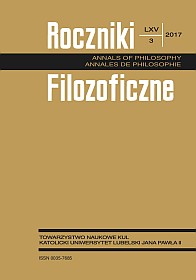The First and Second Orders of the Will in Medieval Thought: From Augustine to William of Auxerre
Abstract
Harry Frankfurt’s concept of autonomy that has been acknowledged as one of the most important theories of autonomy underlines the essential role of a moral agent’s ability to reflect on herself and her life. The core element of the concept is the ability of a moral agent to formulate first as well as second order desires. Intriguing seems the fact that we can find the concepts referring to the complexity of the will and its first and second order acts already in medieval thought. In this paper I examine the development of the terminology and argumentation employed in these medieval concepts which analyze first and second order acts of the will as well as the subtle difference between various acts of the will. I focus on the concepts formulated until the first half of the 13th century pointing out to the terminology and arguments which became the point of departure for late medieval theories of the will.
References
Anzelm z Canterbury. O wolności woli. Tłum. i wstęp Andrzej Piotr Stefańczyk. Roczniki Filozoficzne 58 (2010), 1: 301–324.
Augustinus. De gratia Christi et de peccato originali. Corpus Scriptorum Ecclesiasticorum Latinorum 42. Ed. Carl Franz Urba i Joseph Zycha. Vindobonae (Vienna), Lipsiae: F. Tempsky, G. Freytag, 1902.
Augustinus. De libero arbitrio. Corpus Christianorum. Series Latina 29. Ed. William M. Green. Turnholti: Brepols, 1970.
Augustinus. De octo dulcitii quaestionibus. Corpus Christianorum. Series Latina 44A. Ed. Almut Mutzenbecher. Turnholti: Brepols, 1975.
Augustinus. Enarrationes in Psalmos 110-118. Enarrationes in Psalmos 110-150, Pars 2. Corpus Scriptorum Ecclesiasticorum Latinorum 95/2. Ed. Franco Gori i Angelo De Nicola. Berlin, Boston: De Gruyter, 2015.
Augustyn. O Trójcy Świętej. Tłum. Maria Stokowska. Kraków: Wydawnictwo Znak, 1996.
Augustyn. Wyznania. Tłum. Zygmunt Kubiak. Kraków: Wydawnictwo Znak, 1999.
Colish, Marcia. Peter Lombard. Vol. I. Leiden, New York, Köln: Brill, 1994.
Dworkin, Gerald. The Theory and Practice of Autonomy. Cambridge: Cambridge University Press, 1988.
Ekenberg, Tomas. „Augustine on Second-Order Desires and Persons”. W: Subjectivity and Selfhood in Medieval and Early Modern Philosophy. Studies in the History of Philosophy of Mind 16. Red. Jari Kaukua i Tomas Ekenberg, 9-24. Dordrecht: Springer International Publishing, 2016
Frankfurt, Harry. Wolność woli i pojęcie osoby. Tłum. Justyna Nowotniak. W: Filozofia moralności. Postanowienie i odpowiedzialność moralna. Red. Jacek Hołówka, 21–39. Warszawa: Spacja/Aletheia 1997.
Guillaume d’Auxerre. Summa aurea. Ed. Jean Ribaillier. Vol. I. Paris: Centre National de la Recherche Scientifique; Grottaferrata (Romaa): Editiones Collegii S. Bonaventurae ad Claras Aquas, 1986
Haworth, Lawrence. Autonomy: An Essay in Philosophical Psychology and Ethics. New Haven: Yale University Press, 1986.
Koszkało, Martyna. „Koncepcja woli według św. Augustyna — perspektywa antropologiczna”. Roczniki Filozoficzne 64 (2016), 3: 5–37.
Langton, Stephanus. Quaestiones Theologiae. Liber I. Auctores Britannici Medii Aevi 22. Ed. Magdalena Bieniak i Riccardo Quinto. Oxford: Oxford University Press, 2014.
[Langton, Stephanus] „Magistri Stephani Langton Ex Summa Quaestionum Theologiae”. Ed. Riccardo Quinto. Cahiers de l’Institut du Moyen-Âge Grec et Latin 62 (1992), 77–165.
Lindley, Richard. Autonomy. London: Macmillan, 1986.
Lombard, Petrus. Sententiae in IV libris distinctae. Vol. I. Grottaferrata (Romae): Collegium S. Bonaventurae Ad Claras Aquas, 1971.
Lombard, Petrus. Sententiae in IV libris distinctae. Vol. II. Grottaferrata (Romae): Collegium S. Bonaventurae Ad Claras Aquas 1981.
Peter of Poitiers. Sententiae. Vol. I. Ed. Philip S. Moore i Marthe Dulong. Notre Dame: The University of Notre Dame Press, 1961.
Peter of Poitiers. Sententiae. Vol. II. Ed. Philip S. Moore, Joseph Garvin i Marthe Dulong. Notre Dame: The University of Notre Dame Press, 1950.
Rogers, Kathrin. „The Purpose, Definition and Structure of Free Will”. W: Debates in Medieval Philosophy. Essential Readings and Contemporary Responses. Red. Jeffrey Hause, 43-60. New York, London: Routlege, 2014.
Rogers, Kathrin. „Anselm on Eudaemonism and the hierarchical structure of moral choice”. Religious Studies 41 (2005), 3: 249–268.
Saarinen, Risto. „Augustine’s Two Wills and Two Goals: Some Applications of Holmström-Hintikka’s Formal Theory”. Ed. Ghita Holmstrom-Hintikka. W: Medieval Philosophy and Modern Times. Synthese Library 288, 121–136. Dordrecht, Boston, London: Kluwer Academic Publishers 2000.
Stump, Eleonore. „Augustine on Free Will”. W: The Cambridge Companion to Augustine. Red. Eleonore Stump i N. Kretzmann, 124–147. Cambridge: Cambridge University Press, 2006.
Williams, Thomas, „Anselm: Free Will and Moral Responsibility”. W: Debates in Medieval Philosophy. Essential Readings and Contemporary Responses. Red. Jeffrey Hause, 61–72. New York, London: Routlege, 2014.
Copyright (c) 2017 Roczniki Filozoficzne

This work is licensed under a Creative Commons Attribution-NonCommercial-NoDerivatives 4.0 International License.





